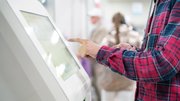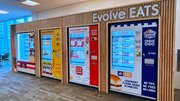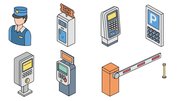Article
Resource kiosks with a human touch
With a 17-kiosk rollout, scientific resources company Boston Scientific joins a growing list of companies turning to kiosks to assist their human resources departments.
June 5, 2004
Last summer, before rolling out its new line of human resources kiosks for its employees, the scientific research company Boston Scientific Corp. pulled one of the common-sense moves out of the kiosk deployment playbook: it beta-tested.
One unit was placed in one of Boston Scientific's facilities to gauge the viability of its ASK (automate services kiosks) program. From a cost standpoint, it was important for the company to know in advance whether the concept would be accepted.
"The reason we needed a prototype was that the machines, on average, cost $10,000 and the program was going to cost $250,000," said Hans Schmidt, Boston Scientific senior business analyst, human resources systems and services. "We didn't want to do a mass project if there would be any disagreements about it."
Turns out that the beta test -- though it is considered one of the most important steps to rolling out a kiosk - was not necessary in this case. The employees accepted the kiosks practically as is and were more than happy to see Boston Scientific roll out 17 units at 10 American facilities.
"We had one to start out with to make sure it was that everything was where we wanted it," said Debbie Quimby, Boston Scientific senior business analyst, human resources. "The keyboard was too far over to the left and (our provider) made the change immediately to our other units."
That provider was Ontario, Calif.-based Arral Industries Inc., which has launched several human resources projects in recent years. Arral director of sales and marketing Ben Wheeler said the HR sector, with its emphasis on employee needs, is fast becoming fertile ground for kiosk deployments.
"It's one of those service applications that kind of came out of nowhere," Wheeler said. "I don't think people realized you could use (kiosks) to input information to change your withholding status."
From concept to execution
Boston Scientific, for one, saw that need. Human resources departments fulfill a lot of functions -- informing employees of job openings, information on health benefits, and 401k and other savings programs. Quimby said her company realized several years ago that there was a need to streamline HR information at the company, but it was not possible under the company's current technology umbrella.
"A lot of our site manufacturers and many employees don't have access to desktop computers," she said. "We wanted them to have access to HR forms and information on their benefits. We also wanted to try to free people up (in the HR department)."
 |
Boston Scientific's ASK (automated services kiosk) program makes the company's human resources information more accessible for its employees. |
After a six-month due diligence process, Boston Scientific turned to Arral to manufacture the sloping, wooden units that have a blue base.
Boston Scientific had some specific requests for the project. There was to be no card reader or cash acceptor, but the company provided a badge scanner to allow employees to sign on as if they were entering their workplace. The company also wanted a laser printer instead of a thermal printer, which is frequently used in kiosks projects.
The fact that Arral was willing to work within Boston Scientific's guidelines sold the company on the project, according to Quimby.
"I found Arral to be very flexible and they met our needs," she said. "There were a few minor changes we needed made to the project and we were very pleased with the result."
Arral created the enclosure, with the badge scanner provided by Boston Scientific, Happ Controls track balls, Elo TouchSystems Inc. touchscreen monitors, and Hewlett Packard back-end laser printers.
"They came to us and said they wanted it to do several things that were out of the ordinary," Wheeler said. "In a lot of ways we had to put a lot of research into it."
Proof of concept
Boston Scientific's kiosk provides information on employment opportunities within the company, the ability to make what Schmidt called "life-event type changes" such as changes benefits and beneficiaries, and information on new company projects.
The kiosk also features limited Internet access. Search engines, music Web sites, and the New York Times site are off limits. But company employees can access information on their 401k accounts, and their dental and health care providers.
Company officials said roughly half of its 1,712 employees eligible to use the 17 kiosks used them at least once during its rollout phase. Between Sept. 15, 2001, and June 5, 2002, 968 different employees logged into the system.
"It's good to see them be so well-received at our sites," Quimby said. "They rolled out very smoothly and overall it's been very positive for our situation."
The kiosks will not completely phase out employee access to the HR department itself. The information available on the kiosks is currently in English only, shutting Boston Scientific offices in China, Japan, Malaysia, and Thailand out of the mix. In addition, Quimby said not everyone in their U.S. offices are comfortable using the kiosks.
"A major barrier is that we have some employees that don't speak English very well," she said. "We need to have those other tools available somehow."
Future plans for the kiosks depend on whether the company is willing to convert the data into other languages for use at its locations in non-English speaking countries. Boston Scientific officials are still studying the viability of those plans.
Versatility and simplicity
For Arral, the Boston Scientific project is one of several involving HR departments throughout the U.S. The company has also deployed 60 units for Chase Manhattan Bank and worked with Apunix Computer Services to deploy 50 units for the Los Angeles Metropolitan Transit Authority.
Wheeler said that while no two HR departments are the same, it is easy to work with companies and adjust programs to their needs. He cited the Chase project as an example. As part of its HR outreach efforts, Chase gives its employees free bank accounts and direct deposits their checks. Employees can get their pay stubs through the kiosk or desktop PCs.
"The direct deposit component allows them to cut down on the number of paper slips that are needed," Wheeler said. "They're saving trees, but they're also saving a lot of money."
 ChatGPT
ChatGPT Grok
Grok Perplexity
Perplexity Claude
Claude









